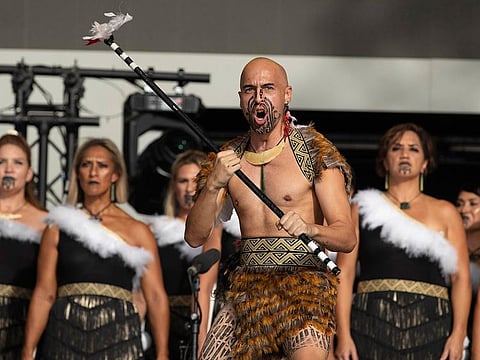Haka: The ancient telling of a Maori tale at Expo 2020 Dubai
Native to the tribes of New Zealand, the group dance is a performance of many meanings

Dubai: It is a dance.
It is a narration.
It is a war cry.
It is an identity.
It is the Maori ‘Haka’.
Almost primeval in rhythm and beat, it rarely fails to move the viewer because it is the passionate telling of an ancient tale, of human emotions and stories that connect the many tribes of New Zealand.
Many are familiar with the Haka, as the country’s famed rugby team the All Blacks perform it before every game. However, at the Expo 2020 Dubai that traditional way of telling a story was experienced in its complete form.
At the Kapa Haka performance
The call of the kaitātaki or the dance leader silences the buzzing crowd seated at the Dubai Millennium Amphitheatre at Expo 2020. A group of well-synchronised performers from New Zealand claim the stage — where their performance begins by the clapping of the hands, on the thighs, and the chest, with voices exclaiming poetic phrases that narrate a story.
A haka is a representation of many things — a welcome for guests, a tribute, an act of love and respect, gratitude and even a challenge. However, at its core lies a connection, with land and the people who carried on the traditions of the past. Performing the Kapa Haka on the stage was New Zealand’s way of welcoming the crowd to their culture and offering a tribute to the UAE for its golden jubilee year.
To perform a Kapa Haka, one must know the way of the Maori, and that is more than just being an aboriginal part of the oceanic country. Kapa haka, translates to “group dance”, and acts as an avenue for the Maori people to showcase their identity.
Peter Rihia-Tamaki, a resident of a small town Raetihi in New Zealand, stands one among this group. “There are many types of dances in Kapa Haka — we have action songs, which is more of entertainment, we have traditional dance, which talks about an event, a place or a time. We have a haka, which is world famous, called all blacks. For us here, the Kapa Haka group in the UAE — we’ve been going on since 2008 and we’ve had members from New Zealand who’ve come into the UAE, join our group,” said Rihia-Tamaki.
A 161-year-old attire
Kapa haka dance performers often wear a native, tribal attire while performing a set. The men wore rapaki, a wraparound kilt, with thrums of black flax fibre. A tatua (waist belt) is worn, along with the rapaki. Women wear a traditional piupiu (flax skirt) with the tatua and poi balls on the side.
“We’ve replicated what our ancestors wore back in the days like they used to wear tattoos over their face whereas women wear it on the chin,” said Rihia-Tamaki. These tattoos are called Tamoko.
A tribute to the UAE
The emotional and powerful performance had gripped the audience so much so that they waited a few minutes to get up and explore the rest of Expo 2020 Dubai’s venue. The kappa haka is not just about synchronisation. Facial expressions or pukana, poi or a ball at the end of a chord, hand movements or waiata-a-ringa and the undeniable haka or war dance are collectively performed through the 25- to 30-minute performance.
“New Zealand is from all over the place — we are a tribal nation — so our members come from different tribes. Today, we performed a set written for the UAE’s Year of 50th celebration, which tells the brief history of the UAE, the formation of the UAE and acknowledges the country. We choose performance sets based on the purpose of the performance. Like I said, part of the performance was a tribute to the UAE. We once performed a song acknowledging the Burj Khalifa.
“Our performances generally last 25 minutes, which is made up of a choral item, a traditional chant, you’ll see some weaponry in there, action songs, the poi, the haka, of course and an exit — which is the way we clear a stage,” explained Rihia-Tamaki.
New Zealand’s participation at Expo 2020 reflects the Maori value of kaitiakitanga, or ‘Care for People and Place’ and emphasises the deep kinship between people and the environment.
Sign up for the Daily Briefing
Get the latest news and updates straight to your inbox









